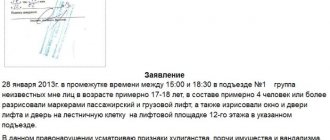Corpus delicti
In order to recognize an act as a crime, all the elements of a crime must be present.
- The object of any offense is public relations, interests, and human rights. The object of extortion is double - firstly, an attack is committed on someone else’s property, and secondly, on a person’s life, health or personal information.
- The objective side is a set of certain actions and the consequences that arise after them. In this case, actions are demands for the transfer of property or rights to it, as well as the use of threats. The consequence can be either the loss of property or the implementation of the criminal’s intentions. Moreover, the presence of consequences does not matter - the crime is considered completed at the moment when the threat is expressed, without putting it into practice.
- Subject. Sanctions under Article 163 of the Criminal Code of the Russian Federation are provided for persons over 14 years of age.
- The subjective side is those motives that prompt a person to commit an act, the goals of the act, as well as the subject’s internal attitude towards his actions. The goal is obvious - obtaining property benefits, and the attitude is characterized by direct guilt - the person must be aware that he is committing an illegal action and consciously strive for it.
NOTE! The Criminal Code provides for liability not only for extortion of money, but also for any property or rights to it. These can be cell phones, equipment, jewelry, clothing, as well as documents on the transfer of rights - sales and purchase agreements, donations, wills, etc.
Recommendations for users
Unfortunately, no one is safe from hacking of a personal account on a social network or online dating with extortionist. However, it is recommended to follow a few tips to prevent the possibility of blackmail:
- Close your personal profile. So, only those users who are included in the friends list will be able to see information about you, look at photos and leave messages.
- Do not add unknown people to your friends or contact list. Let only your friends contact you.
- Change passwords on pages periodically. Choose complex combinations consisting not only of letters, but also numbers.
- Do not send intimate photos or videos to anyone. You cannot send personal materials to friends, your significant other, or strangers.
- If your social network profile has been hacked and you cannot access it, then notify support.
The Internet world is full of dangers, and every user can face them. Be careful when dating online, do not share personal information and pictures, question every word of an unfamiliar interlocutor, and then you will be able to prevent blackmail on the Internet.
We are ready to answer any questions you may have - ask them in the comments
Difference from other types of crimes
Only if all the above-mentioned signs of a crime are present can it be considered extortion. If there are differences, then it is a different type of offense.
Most often, extortion is confused with robbery, theft and robbery. What's the difference between them? Articles for extortion of money (163), robbery (162), theft/theft (158) and robbery (161) provide for different crimes.
Articles for extortion and robbery provide for different punishments
Robbery is an attack committed with the aim of stealing someone else's property, involving the threat or use of violence.
The first mandatory element of the crime of robbery is assault, the second is violence or the threat of its use. In the case of extortion, there will be no attack or violence, only a threat. Extortionists use psychological pressure without resorting to physical actions.
Thus, what these crimes have in common is illegal demands for property and threats. Distinctive features are the presence or absence of an attack, the use of violence.
Theft is the seizure of property without the use of additional means - threats and demands. Moreover, theft can be open (robbery), when money or things are simply taken from the victim in his presence, or ordinary theft.
The main difference between robbery and extortion is the difference in time. Robbery is committed here and now, and extortion is aimed at obtaining money in the future, that is, it is extended over time. In addition, threats and violence in the case of robbery also occur at the same moment as the taking of property, and are real; in extortion, they are promises to commit them sooner or later.
INTERESTING. A demand for the return of money on a receipt or loan, accompanied by threats, is not considered extortion, since the criminal has the right to legally receive funds (through a claim or court). This act falls under Art. 330 Arbitrariness.
We prove the fact of blackmail
If you are nevertheless faced with the use of illegal actions against you in the form of blackmail, you need to put aside panic and approach this issue wisely.
First of all, you need to find out what the information is that they are going to blackmail you with. Moreover, without any written evidence, it will be difficult for the blackmailer to convince others of the plausibility of these facts, so it is worth sensibly assessing the damage that the dissemination of this information may cause to you.
In any case, law enforcement agencies must be notified of the occurrence of such a situation and a statement must be filed with the police, which will initiate an investigation into the crime. However, the investigation must present facts confirming that this illegal action took place.
Such evidence may be a recording of a telephone conversation in which you are threatened, a letter (if the blackmail took place by email, you need to print out the correspondence), photo and video materials, testimony of witnesses, health certificates if physical harm was caused, and so on. can confirm the presence of threats against you.
The most important thing in such a situation is not to be afraid that the information with which you are being blackmailed will be disclosed. After all, it is unknown what lengths a criminal can go to in order to force you to commit any actions that satisfy him.
Read about insurance fraud schemes.
And here about fraud in the banking sector.
It is useful to know “How the liquidation of a credit institution occurs.”
Features of the crime
Extortion on the Internet
Modern technologies also create modern problems. One of the most common types of extortion involves the use of Internet technologies.
The most popular cases are:
- Blackmail using information compromising a person - personal or business correspondence, photographs, videos. According to the Criminal Code of the Russian Federation, extortion in this case is accompanied by another crime - hacking.
- Demand for funds with the threat of hacking or attacking an Internet site, remote store, or other online resources.
Telephone extortion
A very common type of crime. Most often, scammers require:
- payment of a non-existent loan or a loan for another person (relative, friend);
- repayment of an existing loan, but using legally prohibited means (often used by debt collectors);
- money for “saving” a close relative in trouble.
In an educational institution
One of the most common types of extortion in our country. Many people do not even consider this act a crime.
Collections from parents often require:
- for admission to a kindergarten (out of turn, not at the place of residence), to a school (not according to registration), to a secondary or higher educational institution;
- for stationery, purchase of toys, furniture, equipment, etc.,
- repair of a group, classroom, office, garden, school, institute;
- payment of security guards, purchase of security video equipment;
- for the purchase of textbooks, manuals, teaching materials, supplies for teachers (paper, printers, etc.).
ATTENTION! The requirement to purchase clothes for a child in accordance with the dress code established by the Charter is legal. Parents must provide the child with the appropriate uniform. The only thing that is illegal is the condition of purchasing clothes in a specific place.
In the hospital
In medical institutions there is another, specific extortion. Art. 163 does not speak about it directly, but implies it. This is a threat not by action, but by inaction. For example, a promise to delay an urgent operation, or to perform it poorly if the money is not received in advance.
At work
Cases of extortion at work include:
- payment of losses, shortages without legal grounds (lack of audit, for those days when the person did not work, in relation to a person not financially responsible);
- gathering for events, holidays, without the employee’s desire;
- arrangement of the workplace, acquisition of tools and equipment, repair work;
- various types of charitable contributions;
- forced repurchase of enterprise products or use of services.
Extortion from minors
The most common type of extortion from a minor is older students demanding money or valuable property from younger students. Sometimes classmates also make such threats. What should you do in this situation?
Parents can contact the legal representatives of the hooligans (parents, guardians) or, bypassing them, directly to the teaching staff of the educational institution. Sometimes both the teacher and the class teacher can influence children. If this does not help, you should contact the head teacher or director. If there is no response from the above-mentioned persons, it is necessary to submit a statement to the Juvenile Affairs Committee (Commission on Minors) or to the police.
It should be remembered that criminal liability for extortion (clause 2 of Article 20 of the Criminal Code of the Russian Federation) begins at the age of 14; if the offender is younger, his parents will bear the punishment.
The term for extortion can be received at the age of 14 years.
Judicial practice under Art. 163 of the Criminal Code of the Russian Federation
Example 1. Citizens P. and T. were fired from the plant for regular drunkenness. Angry at Director V., they conducted surveillance on the former boss. From gossip, P. knew that the director had a mistress, and his wife was a jealous lady. In addition, all employees of the enterprise knew that the plant was jointly owned by the spouses. P. and T. filmed the meeting of the former manager with the girl on a mobile phone. The scene left no doubt about the nature of the couple's relationship.
P. and T. presented the director with a demand for the monthly transfer of 100,000.0 rubles. in favor of each criminal under the threat of handing over the video to a jealous wife. V. hired a lawyer. The specialist recommended contacting the police. As a result, P. and T. were accused of qualified extortion. The components of the act are:
- threat to V.'s reputation;
- financial requirement.
USEFUL INFORMATION: Period for challenging an inheritance
Example 2. Previously convicted S. learned that elderly neighbor A. has a plot of land on the southern coast of Crimea. The woman was already 78 years old, she lived alone and had no close relatives. S. began to pay visits to the neighbor and demand that the documents for the land be re-registered in his favor. He threatened the woman with physical harm.
S. did not contact the police immediately, as she was not aware of the nuances of blackmail. She told her neighbor’s actions to her nephew, who lived in another city. The young man rushed to help his aunt, but he arrived late. While intoxicated, S. came to the woman and repeated his demands. Having received a refusal, he hit her on the head with an iron rod, A. died.
The court accused S. of several articles, including paragraph 63 for extortion. Based on the totality of his guilt, taking into account his previous criminal record, the offender was sentenced to life imprisonment.
Example 3. A minor (13 years old) A. saw that his 15-year-old neighbor was dating a married man. He photographed explicit scenes and began to demand money from the girl. He threatened to post the photo on a popular local forum. The girl complained about the young man’s actions to her father, an investigator from the prosecutor’s office. Open relationships in the family made it possible to tell everything as it is. It was not possible to initiate criminal proceedings against A., since he had not yet achieved responsibility. After the measures were taken, he was sent to an educational institution for minors.
Term for extortion
Art. 163 of the Criminal Code of the Russian Federation provides for punishment for extortion. If the crime is committed without aggravating circumstances, the convicted person may receive:
- restriction of freedom (up to 4 years);
- forced labor for the same period;
- forced labor associated with restriction of freedom (up to 2 years);
- arrest (up to 6 months);
- imprisonment (up to 4 years);
- similar imprisonment and a fine of 80,000 rubles. or six months' earnings.
If extortion is committed on a large scale, the following types of punishment are provided:
- imprisonment (up to 7 years);
- imprisonment and a fine of up to 500,000 rubles. or three years' earnings
- all of the above plus restriction of freedom for up to 2 years.
Complex crimes (committed by an organized group, on a particularly large scale, causing grievous harm to health) are provided for in Part 3 of the article for extortion of the Criminal Code of the Russian Federation. The term of imprisonment increases from 7 to 15 years, a fine of up to a million or income for five years and restriction of freedom up to 2 years.
THIS IS INTERESTING. An amount over 250,000 rubles is considered large, and especially large – 1 million rubles.
Sanctions under Article 163 of the Criminal Code of the Russian Federation depend on the amount and the presence of aggravating circumstances
Arbitrage practice
Example 1. In Odintsovo, the manager was detained. head of administration. The official demanded that a representative of a local commercial organization transfer money to him in the amount of 8 million rubles for approving the transfer of a land plot and increasing its area. For receiving half of a bribe in the amount of 4 thousand rubles, the official was detained by law enforcement officers. The defendant was found guilty and sentenced to imprisonment for a period of 8 years.
Example 2. In Pyatigorsk, a law enforcement officer was convicted for extorting a bribe of 350 thousand rubles from a local resident for refusing to initiate a criminal case against the applicant for child abuse. The local resident transferred the designated amount to the convict in several stages. When transferring the last amount of 100 thousand rubles, the bribe taker was caught red-handed. All necessary examinations were carried out and evidence was obtained. The court found the policeman guilty and sentenced him to 7 years in prison to serve the sentence in a maximum security correctional colony, as well as deprivation of the right to hold a position in the public service for a period of 3 years.
Example 3. Employees of the Economic Security Anti-Corruption Department of the Ministry of Internal Affairs of the Russian Federation detained an associate professor at one of the universities in Omsk on suspicion of receiving illegal funds from a student in the amount of 30 thousand rubles. The university management itself took the initiative to catch the criminal. Together with law enforcement agencies, they detained the criminal in the auditorium of the institution. A criminal case was initiated against the suspect under the article for accepting a bribe by an official. The convict was sentenced to 2 years in prison with deprivation of the right to hold his previous position for a period of 3 years.
USEFUL INFORMATION: Deadline for accepting an inheritance: by will, by law
Example 4. An investigator of the Ministry of Internal Affairs of Russia in the Nizhny Novgorod region demanded money in the amount of 30 thousand rubles from a witness in a criminal investigation of a violation of traffic rules for not seizing a passenger car belonging to the witness, which is important for the criminal case. In order to force the witness to give a bribe, the police officer threatened him with criminal prosecution. Inside a private car, the accused received from a man part of the required bribe in the amount of 15 thousand rubles. At the time the culprit was detained red-handed by security officers of the Main Directorate of the Ministry of Internal Affairs of Russia for the Nizhny Novgorod Region, the accused offered active resistance. He collided with several vehicles of the operational services of the Russian Ministry of Internal Affairs. This employee was fired. He was brought to justice under Art. 290 “Taking a bribe.” Now he will have to think about his actions in prison for 5 years.
How to behave
If they demand money or other property from you, you must follow a few simple rules:
- remain calm, do not give in to provocations, do not follow your initial emotions;
- agree with the requirements, but come up with a way to stall for time (there is no money available, you need to collect it, the card is lost or seized, etc.);
- collect the maximum amount of evidence of the offense (dictaphones, audio, video recordings, witnesses);
- contact law enforcement agencies.
How to correctly write a statement about extortion (sample for downloading)
Reports of criminal offenses are filed with the police at the place where the offense was committed (even if you are in a foreign city). The document should indicate:
- data of the victim;
- date of commission of the crime;
- circumstances of the act (place, reason, size of property required, what threats were used)
- ransomware data (maximum known);
- the date, place and circumstances under which the property must be transferred.
The application must indicate what other evidence is available. If you know that this is not the first ransomware crime, try to contact other victims. Proving this offense if there are collective statements is much easier.
According to statistics, extortion is one of the few crimes whose number has recently begun to decline.
The increase in punishment under the article of the Criminal Code played a significant role. Extortion of money becomes a more complex action, with various opportunities to collect evidence (video, audio, which the criminal may not notice). I would like to believe that these statistics show a real decrease in crime, and not an increase in the sophistication of criminals who are difficult to catch in the act. Order a free legal consultation
Where to contact
To protect yourself and your rights, you should contact the police with a statement. The paper must clearly state all the circumstances of the incident. It is recommended to avoid emotionality.
The following must be indicated:
- date of the incident;
- description of the offender - full name, if there is no such data, then a description of appearance (height, hair color, eyes, build, etc.);
- demands made by the extortionist;
- the list and nature of the threats, as well as related factors (for example, violent acts, offensive language, etc.);
- date and place of meeting for the transfer of property assets.
Download a statement to the police about extortion of money (sample)
It is important to clarify that the fact of the crime is considered completed at the time the demand is presented. That is, there is no need to wait until the day the property is transferred to seek help and report illegal actions. Rights are violated by the very voicing of the demand, which should be reported to the authorities at the place where the criminal act was committed.
The attacker's "action plan". Where can I find evidence?
There are two ways to prove the actions of a criminal. On your own or with the help of police officers.
Important! Extortion is considered a hidden crime. It is not always possible for a victim to find the moral strength to contact the police to protect himself. In most cases, attackers focus on the psychological factor.
Without police help
When faced with extortion, do not rush to panic. If you are unable to get rid of the ransomware, try to pretend that you agree to comply with all its demands. This is necessary in order to stall for time. You can collect evidence that will help confirm the fact of threats and extortion.
Witness testimony can be excellent evidence. At the same time, try not to be alone. Witnesses will be able to confirm that the extortionist insistently demanded to agree to his terms, threatening violence or other actions. These facts will be necessary during the trial.
The presence of an audio recording or video will help prove the guilt of the extortionist. This could be a hidden camera, voice recorder, mobile phone and other gadgets. When making a recording, play along with the criminal and try to get him to have a frank conversation. Specify the amount, conditions, time of transfer, and also tell us about your fears of the threat. The attacker will begin to threaten if you refuse to agree to his terms. Thus, the criminal will give himself away, telling about all his intentions.
Look for your brothers in misfortune. Very often, the ransomware affects several victims at once. Of course, not every one of them will agree to tell others about their misfortune. But they can be a good support in trying to defend your rights.
It should be noted that many people encounter strange messages that unexpectedly arrive on their mobile phone. This has already become a very common practice. The content of such text messages or calls has a general direction. Your loved one has had an accident or other misfortune and urgently needs funds.
Don't rush into a panic attack. Many people forget about common sense and rush to transfer their savings to the specified address. Fraudsters rely specifically on the “effect of surprise.” If you receive a call on your phone, try to ask leading questions to quickly figure out the attacker. If reported, contact loved ones to ensure their well-being.









